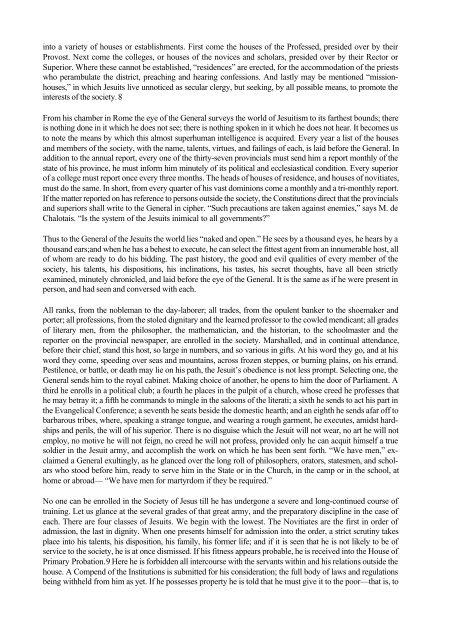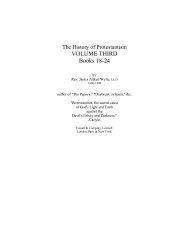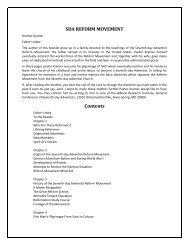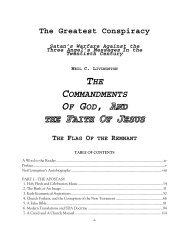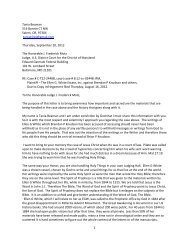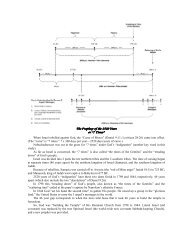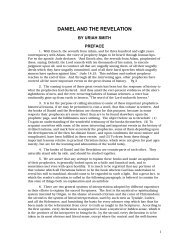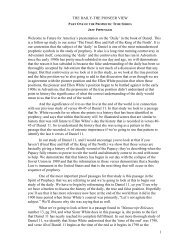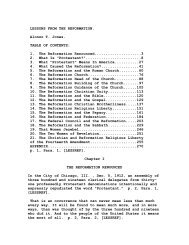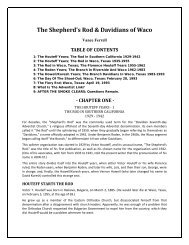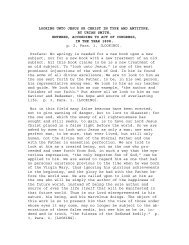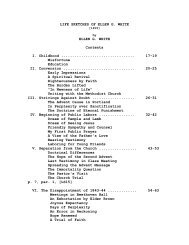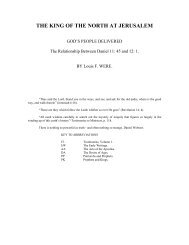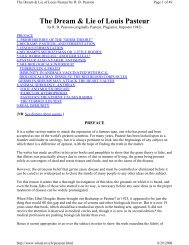History of Jesuits
History of Jesuits
History of Jesuits
You also want an ePaper? Increase the reach of your titles
YUMPU automatically turns print PDFs into web optimized ePapers that Google loves.
into a variety <strong>of</strong> houses or establishments. First come the houses <strong>of</strong> the Pr<strong>of</strong>essed, presided over by their<br />
Provost. Next come the colleges, or houses <strong>of</strong> the novices and scholars, presided over by their Rector or<br />
Superior. Where these cannot be established, “residences” are erected, for the accommodation <strong>of</strong> the priests<br />
who perambulate the district, preaching and hearing confessions. And lastly may be mentioned “missionhouses,”<br />
in which <strong>Jesuits</strong> live unnoticed as secular clergy, but seeking, by all possible means, to promote the<br />
interests <strong>of</strong> the society.8<br />
From his chamber in Rome the eye <strong>of</strong> the General surveys the world <strong>of</strong> Jesuitism to its farthest bounds; there<br />
is nothing done in it which he does not see; there is nothing spoken in it which he does not hear. It becomes us<br />
to note the means by which this almost superhuman intelligence is acquired. Every year a list <strong>of</strong> the houses<br />
and members <strong>of</strong> the society, with the name, talents, virtues, and failings <strong>of</strong> each, is laid before the General. In<br />
addition to the annual report, every one <strong>of</strong> the thirty-seven provincials must send him a report monthly <strong>of</strong> the<br />
state <strong>of</strong> his province, he must inform him minutely <strong>of</strong> its political and ecclesiastical condition. Every superior<br />
<strong>of</strong> a college must report once every three months. The heads <strong>of</strong> houses <strong>of</strong> residence, and houses <strong>of</strong> novitiates,<br />
must do the same. In short, from every quarter <strong>of</strong> his vast dominions come a monthly and a tri-monthly report.<br />
If the matter reported on has reference to persons outside the society, the Constitutions direct that the provincials<br />
and superiors shall write to the General in cipher. “Such precautions are taken against enemies,” says M. de<br />
Chalotais. “Is the system <strong>of</strong> the <strong>Jesuits</strong> inimical to all governments?”<br />
Thus to the General <strong>of</strong> the <strong>Jesuits</strong> the world lies “naked and open.” He sees by a thousand eyes, he hears by a<br />
thousand ears;and when he has a behest to execute, he can select the fittest agent from an innumerable host, all<br />
<strong>of</strong> whom are ready to do his bidding. The past history, the good and evil qualities <strong>of</strong> every member <strong>of</strong> the<br />
society, his talents, his dispositions, his inclinations, his tastes, his secret thoughts, have all been strictly<br />
examined, minutely chronicled, and laid before the eye <strong>of</strong> the General. It is the same as if he were present in<br />
person, and had seen and conversed with each.<br />
All ranks, from the nobleman to the day-laborer; all trades, from the opulent banker to the shoemaker and<br />
porter; all pr<strong>of</strong>essions, from the stoled dignitary and the learned pr<strong>of</strong>essor to the cowled mendicant; all grades<br />
<strong>of</strong> literary men, from the philosopher, the mathematician, and the historian, to the schoolmaster and the<br />
reporter on the provincial newspaper, are enrolled in the society. Marshalled, and in continual attendance,<br />
before their chief, stand this host, so large in numbers, and so various in gifts. At his word they go, and at his<br />
word they come, speeding over seas and mountains, across frozen steppes, or burning plains, on his errand.<br />
Pestilence, or battle, or death may lie on his path, the Jesuit’s obedience is not less prompt. Selecting one, the<br />
General sends him to the royal cabinet. Making choice <strong>of</strong> another, he opens to him the door <strong>of</strong> Parliament. A<br />
third he enrolls in a political club; a fourth he places in the pulpit <strong>of</strong> a church, whose creed he pr<strong>of</strong>esses that<br />
he may betray it; a fifth he commands to mingle in the saloons <strong>of</strong> the literati; a sixth he sends to act his part in<br />
the Evangelical Conference; a seventh he seats beside the domestic hearth; and an eighth he sends afar <strong>of</strong>f to<br />
barbarous tribes, where, speaking a strange tongue, and wearing a rough garment, he executes, amidst hardships<br />
and perils, the will <strong>of</strong> his superior. There is no disguise which the Jesuit will not wear, no art he will not<br />
employ, no motive he will not feign, no creed he will not pr<strong>of</strong>ess, provided only he can acquit himself a true<br />
soldier in the Jesuit army, and accomplish the work on which he has been sent forth. “We have men,” exclaimed<br />
a General exultingly, as he glanced over the long roll <strong>of</strong> philosophers, orators, statesmen, and scholars<br />
who stood before him, ready to serve him in the State or in the Church, in the camp or in the school, at<br />
home or abroad— “We have men for martyrdom if they be required.”<br />
No one can be enrolled in the Society <strong>of</strong> Jesus till he has undergone a severe and long-continued course <strong>of</strong><br />
training. Let us glance at the several grades <strong>of</strong> that great army, and the preparatory discipline in the case <strong>of</strong><br />
each. There are four classes <strong>of</strong> <strong>Jesuits</strong>. We begin with the lowest. The Novitiates are the first in order <strong>of</strong><br />
admission, the last in dignity. When one presents himself for admission into the order, a strict scrutiny takes<br />
place into his talents, his disposition, his family, his former life; and if it is seen that he is not likely to be <strong>of</strong><br />
service to the society, he is at once dismissed. If his fitness appears probable, he is received into the House <strong>of</strong><br />
Primary Probation.9 Here he is forbidden all intercourse with the servants within and his relations outside the<br />
house. A Compend <strong>of</strong> the Institutions is submitted for his consideration; the full body <strong>of</strong> laws and regulations<br />
being withheld from him as yet. If he possesses property he is told that he must give it to the poor—that is, to


